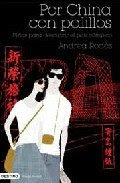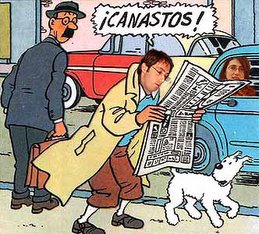They day Jose Manuel D. Barroso deserved a gold medal
José Manuel Durao Barroso is seen by many as the lowest profile European Commission president in history. He is far from being a charismatic politician, but I think it is not his fault: the more developed and stablished is a democracy, the less visionaires (or let's say, Churchills) it needs. Politicians become managers and technocrats because the system keeps running properly (I didn't say perfect). I also believe that europeism needs now a lot of Churchills (Joschka Fischer, Daniel Cohn Bendit and Jean Claude Juncker are rare examples). Barroso is not one of them: he is not brilliant and he commited the worst possible mistake supporting the Iraq war.
But Barroso is a top representative of the EU, and it means a lot. He not only represents the interests of 490 million EU citizens, he must also defend the values the EU was founded for. Last April he was in Beijing leading the biggest European Commission (EC) delegation ever to visit China. The day he met premier Wen Jiabao they gave together an institutional speech for the press. Later, Barroso confronted again the press but in a 'freer' atmosphere, in the EC Beijing headquarters.
A chinese female journalist (chinese journalists seem to be almost always women under 30 years old) asked Barroso what was his opinion about the harsh reaction from the chinese people (boycott to Carrefour, demonstrations and so on) to
1, to the protests in Paris, Athens and London against the chinese repression in Tibet.
2, to the position of several european leaders to reject the invitation to assist to the olympics opening ceremony.
3, to a call approved by the European Parliament asking the EU to investigate the riots in Lhasa.
The chinese journalist quoted her government as saying that all these actions were "an arrogant interference in China's domestic affairs". Here is what Barroso answered:
"We in Europe do not consider Human Rights as an interference because we defend Human Rights as a universal value".
"In the European Parliament you can find a wide range of opinions and sometimes there also [opinions] against the position of our governments".
"I suggest the chinese authorities to be ready to accept criticism because we are now in an open [global] society where dialogue and criticism should be accepted".
C.



1 comentario:
Noticias del Mundo | Audio libros | Libros Gratis | Busca libros | Cien libros | La Imprenta en San José | Cris Namus la Boxeadora | Haiti la gran Mentira | Mi página | Free Web Plantillas| El poder del Tinto | Pasos para recuperar un CD | Muscia Total | La Soucion | Lely Luz Flores | Noticias de la construciion | decoracion con piedras | Gripe A h1n1 | Iluminacion | Curiositio
Publicar un comentario